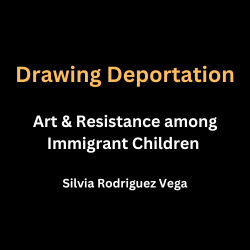
Guest blog by author Silvia Rodriguez Vega
A few months ago I received an email announcing a forthcoming book on immigrant children’s art. The email asked if I’d be interested in learning more about the publication and perhaps connecting with the author. I found the synopsis fascinating and believed it would be of interest to the RFC community; what’s more, I recognized the author as a former RFC targeted activist youth beneficiary and was thrilled to have the chance to reconnect and learn about how much she’s accomplished in the past few years. In her own words, here’s more about her exciting new book and the important work it documents. – Jenn Meeropol, RFC Executive Director
The new book, Drawing Deportation: Art and Resistance Among Immigrant Children hit bookshelves on Valentine’s Day and was described as a love letter to immigrant children. However, it is also bitter medicine to understand the American tragedy known as family separation. The book is based on work with children of immigrants along border states like Arizona and California who contend with the fear and stress related to family separation that our current enforcement-focused immigration system creates.
Drawing Deportation argues that young immigrant children often do not have the words to express how their lives are shaped by issues of immigration, legal status, and state-sanctioned violence. Yet they are able to communicate its effects on them using art. Based on over a decade of work with immigrant children as young as six years old and featuring an analysis of three hundred drawings, theater performances, and family interviews—Silvia Rodriguez Vega provides accounts of children’s challenges with deportation and family separation.
This work also complicates our understanding of the legal system. It specifically shows how anti-immigrant policies come to function as legal violence—the normalized but cumulatively injurious effects of the law. Through the use of traditional qualitative methods and artistic interventions, this book illuminates the impact of the “Deportation Machinery” by highlighting how anti-immigrant policies and family-separation tactics were weaponized against immigrant families and children under both the Obama and Trump Administrations.
While much of the literature on immigrant children depicts them as passive, when viewed through this lens they appear as agents of their own stories. The volume provides key insights into how immigrant children in both states presented creative, out-of-the-box, powerful solutions to the dilemmas that anti-immigrant rhetoric and harsh immigration laws present. Through art, they demonstrated a righteous indignation against societal violence, dehumanization, and death as a tool for navigating a racist, anti-immigrant society.
When children are the agents of their own stories, they can reimagine destructive situations in ways that adults sometimes cannot, offering us alternatives and hope for a better future. At once devastating and revelatory, Drawing Deportation provides a roadmap for how art can provide a safe and necessary space for vulnerable populations to assert their humanity in a world that would rather divest them of it.
Author: Silvia Rodriguez Vega is an interdisciplinary scholar and assistant professor at University of California, Santa Barbara’s Department of Chicana/o Studies. She is also a community engaged writer, artist, and educational practitioner. More broadly, she is interested in issues of structural inequality, legal violence, Youth Participatory Action Research (YPAR), ethnic studies, K-12 education, immigration policy, mixed-status families, childhood, transborder relations, undocumented youth and children, and arts and artivism through performance and digital media. Silvia and her family have experienced the impact of anti-immigrant policies and family separation and are grateful to have been beneficiaries of the Rosenberg Fund for Children.
Drawing Deportation: Art and Resistance Among Immigrant Children is now available to purchase. Check your local bookstores or find it online at bookshop.org.

Comments
Children and Immigration
In my psychotherapy practice, I had the privilege of working with two sisters, one in 11th and one in 12th grade, who came with their parents into this country illegally from Brazil when they were 11 and 12 years old. I had worked with them each for a long time before the older sister shared her story of being separated from her father at the border and then being taken to a holding facility for children. She seemed surprised that I asked about her entry to the US, and, as she talked about it, we both became aware of how painful and scary this experience was. The younger sister could not talk about her entrance at all. I am grateful that you have shared this book with the. RFC families because I think any insight into the experience of migrant children will help to increase our ability to communicate with and about migrant children to help them recover and to support those we know are about to cross the border.
Add new comment